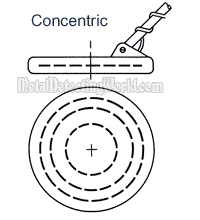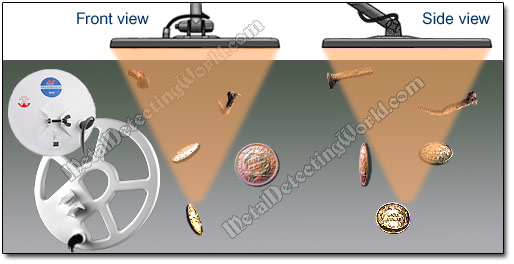Search Coils for Metal Detectors, page 2
Types of Search Coils:
Choose Right Coil for Metal Detecting, Info on Search Coil Types, Designs and Sizes
Choosing the Right Coil for the Job: Info on Search Coil Types, Designs and Sizes
Both the type and size of a search coil you use make a big difference in the process. That is why it is important to choose a right search coil for your metal detecting task or your particular style of hunting. The search coil types in use today are represented by the following coil configurations:
1) Concentric/Coplanar

This search coil's design incorporates two transmit coils (windings) and one receive coil of unequal diameters aligned on the same center. This allows all three windings to occupy the same plane or level (as shown by illustration on the right).
The concentric/coplanar style is the most common and is used on most detectors designed for coin, jewelry, and relic hunting. Concentric coil's electromagnetic field detection pattern is conical in shape (extending above and below the coil windings) with the greatest density directly under the coil's center.
Concentric search coils can be thin, thick, solid or doughnut-shaped. Some concentric coils give the appearance of a spider's web. These are called spider coils or open web designs. Some metal detector users find the spider coils to be a little sturdier and seem to present fewer false signals than the standard concentric coils.
Concentric coils are also made in elliptical and semi-elliptical designs. The main advantage of elliptical design is that it can cover more ground for each sweep of the coil when compared to a round coil with the same coil area.
Elliptical coils can also be maneuvered more easily in dense vegetation and between rocks on rough terrain than the round concentric coils. However, it can be more difficult to achieve precise pinpointing of small targets with the elliptical design.
Concentric Coil Disadvantages:
• Because the concentric coil's electromagnetic field detection pattern is conical, it imposes a disciplined overlapping of sweeps to ensure thorough ground coverage; otherwise, many targets will be missed (as shown by illustration below).
Concentric/Coplanar Search Coils and Their Cone-Shaped Detection Pattern

• Concentric coils are affected by heavy ground mineralization, "hot rocks" and salt water: they are less stable in these extreme environments.
Concentric Coil Advantages:
• Pinpointing with concentric coils is easy and precise because the strongest signal is always in the center of the coil.
• Concentric coils are the most compatible with the Discrimination function and discriminate very well.